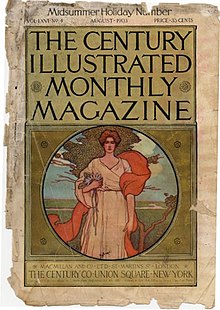The Century (magazine)
 |
|
| First issue | 1881 |
|---|---|
| Final issue | 1930 |
| Company | The Century Company |
| Country | United States |
| Based in | New York City |
| Language | English |
The Century Magazine was first published in the United States in 1881 by The Century Company of New York City, which had been bought in that year by Roswell Smith and renamed by him after the Century Association. It was the successor of Scribner's Monthly Magazine and ceased publication in 1930.
In 1921, The Cambridge History of English and American Literature summarized the early history of the magazine:
After the death of Charles Scribner differences arose between the management, and the publishing firm of Charles Scribner’s Sons, which resulted in the withdrawal of the Scribner interests and a change of name to The Century Magazine in 1881. Dr. Holland was to have continued in the editorship, but before the appearance of the first issue of the Century he died, and was succeeded by Richard Watson Gilder, who from the first had been associate editor. The change of name brought no radical change in scope or policy, and Scribner’s Monthly and the Century constitute virtually an unbroken series from 1870 to the present time.
Dr. Holland was a clever editor who knew what the public wanted. From the first he secured well-known contributors of high rank. A "Publisher’s Department," with "A word to our readers," or "A talk with our readers," though relegated to the advertising pages, continued the methods of the old-fashioned personal journalist. Richard Watson Gilder was a man of greater literary ability and finer taste, and though he could hardly have gained initial success for the venture as well as did Holland it is to him that the high rank of the Century is largely due. [...]
The Century has always given much space to illustrated articles on history. There was something a trifle "journalistic" in a series of articles on the Civil War by Northern and Southern generals, yet even in these the editorial control was such as to insure a reasonable standard of excellence. The Life of Lincoln by Nicolay and Hay, large parts of which appeared serially in the Century, was of higher grade. In literary criticism E. C. Stedman had, even in the days of Scribner’s Monthly, contributed articles on the American poets. Without neglecting fiction, poetry, and other general literature the magazine has devoted rather more attention than has Harper’s to matters of timely, though not of temporary, interest.
...
Wikipedia
